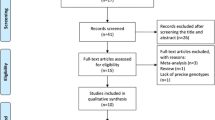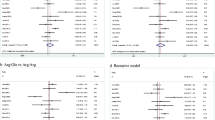Abstract
Emerging evidence suggests that genetic polymorphisms in X-ray repair cross-complementation group 1 (XRCC1) gene could be associated with pancreatic cancer risk. However, previous published studies on the association between XRCC1 rs1799782 genetic polymorphism and pancreatic cancer risk reported inconsistent results. For better understanding of the effects of XRCC1 rs1799782 genetic polymorphism on pancreatic cancer risk, we conducted a meta-analysis of previous published studies by calculating the pooled odds ratio (OR) with a 95 % confidence interval (95 % CI). A total of five eligible studies with 1,144 pancreatic cancer cases and 2,925 controls were eventually enrolled. Overall, we found that the XRCC1 rs1799782 genetic polymorphism was not associated with pancreatic cancer risk in total population under all genetic models (TT vs. CC: OR = 1.11, 95 % CI 0.76–1.63, P = 0.583; CT vs. CC: OR = 1.39, 95 % CI 0.92–2.10, P = 0.118; TT/CT vs. CC: OR = 1.39, 95 % CI 0.92–2.10, P = 0.121; TT vs. CT/CC: OR = 1.07, 95 % CI 0.73–1.55, P = 0.743; T vs. C: OR = 1.31, 95 % CI 0.93–1.86, P = 0.125). In the subgroup analysis based on ethnicity, there was no statistically significant association between XRCC1 rs1799782 genetic polymorphism and pancreatic cancer risk in Asians/Caucasians under all genetic models (all P values > 0.05). No publication bias was detected in this study. Our meta-analysis suggests that the XRCC1 rs1799782 genetic polymorphism is not significantly associated with pancreatic cancer risk. Considering the limited sample size and ethnicity enrolled in this meta-analysis, further larger scaled studies are needed to provide a more precise estimation on the association.


Similar content being viewed by others
References
Jemal A, Siegel R, Ward E, Murray T, Xu J, Thun MJ. Cancer statistics, 2007. CA Cancer J Clin. 2007;57:43–66.
Tanaka M, Okazaki T, Suzuki H, Abbruzzese JL, Li D. Association of multi-drug resistance gene polymorphisms with pancreatic cancer outcome. Cancer. 2011;117:744–51.
Nakao M, Hosono S, Ito H, Watanabe M, Mizuno N, Sato S, et al. Selected polymorphisms of base excision repair genes and pancreatic cancer risk in Japanese. J Epidemiol. 2012;22:477–83.
Yan Y, Chen X, Li T, Li M, Liang H. Association of OGG1 Ser326Cys polymorphism and pancreatic cancer susceptibility: evidence from a meta-analysis. Tumour Biol. 2013. doi:10.1007/s13277-013-1317-7.
Hansel DE, Kern SE, Hruban RH. Molecular pathogenesis of pancreatic cancer. Annu Rev Genomics Hum Genet. 2003;4:237–56.
Vaccaro V, Gelibter A, Bria E, Iapicca P, Cappello P, Di Modugno F, et al. Molecular and genetic bases of pancreatic cancer. Curr Drug Targets. 2012;13:731–43.
Li D, Frazier M, Evans DB, Hess KR, Crane CH, Jiao L, et al. Single nucleotide polymorphisms of RecQ1, RAD54L, and ATM genes are associated with reduced survival of pancreatic cancer. J Clin Oncol. 2006;24:1720–8.
Lowenfels AB, Maisonneuve P. Epidemiology and risk factors for pancreatic cancer. Best Pract Res Clin Gastroenterol. 2006;20:197–209.
Larsson SC, Orsini N, Wolk A. Body mass index and pancreatic cancer risk: a meta-analysis of prospective studies. Int J Cancer. 2007;120:1993–8.
Luo J, Iwasaki M, Inoue M, Sasazuki S, Otani T, Ye W, et al. Body mass index, physical activity and the risk of pancreatic cancer in relation to smoking status and history of diabetes: a large-scale population-based cohort study in Japan—the JPHC study. Cancer Causes Control. 2007;18:603–12.
Duell EJ, Holly EA, Bracci PM, Wiencke JK, Kelsey KT. A population-based study of the Arg399Gln polymorphism in X-ray repair cross-complementing group 1 (XRCC1) and risk of pancreatic adenocarcinoma. Cancer Res. 2002;62:4630–6.
Li D, Li Y, Jiao L, Chang DZ, Beinart G, Wolff RA, et al. Effects of base excision repair gene polymorphisms on pancreatic cancer survival. Int J Cancer. 2007;120:1748–54.
McWilliams RR, Bamlet WR, Cunningham JM, Goode EL, de Andrade M, Boardman LA, et al. Polymorphisms in DNA repair genes, smoking, and pancreatic adenocarcinoma risk. Cancer Res. 2008;68:4928–35.
Shen WD, Chen HL, Liu PF. XRCC1 polymorphisms and pancreatic cancer: a meta-analysis. Chin J Cancer Res. 2011;23:165–70.
Jiang H, Wu D, Ma D, Lin G, Liang J, Jin J. Association between X-ray repair cross-complementation group 1 rs25487 polymorphism and pancreatic cancer risk. Tumour Biol. 2013;34:3417–21.
Jiao L, Bondy ML, Hassan MM, Wolff RA, Evans DB, Abbruzzese JL, et al. Selected polymorphisms of DNA repair genes and risk of pancreatic cancer. Cancer Detect Prev. 2006;30:284–91.
Wang L, Lin DX, Lu XH, Miao XP, Li H. Polymorphisms of the DNA repair genes XRCC1 and XPC: relationship to pancreatic cancer risk. Wei Sheng Yan Jiu. 2006;35:534–6.
Yan D, Wang XY, Li HJ, Xu XJ, Zhu GB, He TY. Relationship between single nucleotide polymorphisms and its haplotype of X-ray repair cross complementing group 1 and susceptibility of pancreatic carcinoma. Zhonghua Zhong Liu Za Zhi. 2013;35:472–7.
Cochran WG. The combination of estimates from different experiments. Biometrics. 1954;10:101–29.
Higgins JP, Thompson SG. Quantifying heterogeneity in a meta-analysis. Stat Med. 2002;21:1539–58.
Higgins JP, Thompson SG, Deeks JJ, Altman DG. Measuring inconsistency in meta-analyses. BMJ. 2003;327:557–60.
Lau J, Ioannidis JP, Schmid CH. Quantitative synthesis in systematic reviews. Ann Intern Med. 1997;127:820–6.
DerSimonian R, Laird N. Meta-analysis in clinical trials. Control Clin Trials. 1986;7:177–88.
Mantel N, Haenszel W. Statistical aspects of the analysis of data from retrospective studies of disease. J Natl Cancer Inst. 1959;22:719–48.
Egger M, Davey Smith G, Schneider M, Minder C. Bias in meta-analysis detected by a simple, graphical test. BMJ. 1997;315:629–34.
Begg CB, Mazumdar M. Operating characteristics of a rank correlation test for publication bias. Biometrics. 1994;50:1088–101.
Acknowledgments
This work was supported by Science and Technology Plan Projects of Hunan Province (2012FJ3105).
Conflicts of interest
None
Author information
Authors and Affiliations
Corresponding author
Additional information
The Publisher and Editor retract this article in accordance with the recommendations of the Committee on Publication Ethics (COPE). After a thorough investigation we have strong reason to believe that the peer review process was compromised.
An erratum to this article can be found online at http://dx.doi.org/10.1007/s13277-017-5487-6.
An erratum to this article is available at http://dx.doi.org/10.1007/s13277-017-5487-6.
About this article
Cite this article
He, G., Chen, G., Chen, W. et al. RETRACTED ARTICLE: Lack of association of XRCC1 rs1799782 genetic polymorphism with risk of pancreatic cancer: a meta-analysis. Tumor Biol. 35, 4545–4550 (2014). https://doi.org/10.1007/s13277-013-1598-x
Received:
Accepted:
Published:
Issue Date:
DOI: https://doi.org/10.1007/s13277-013-1598-x




